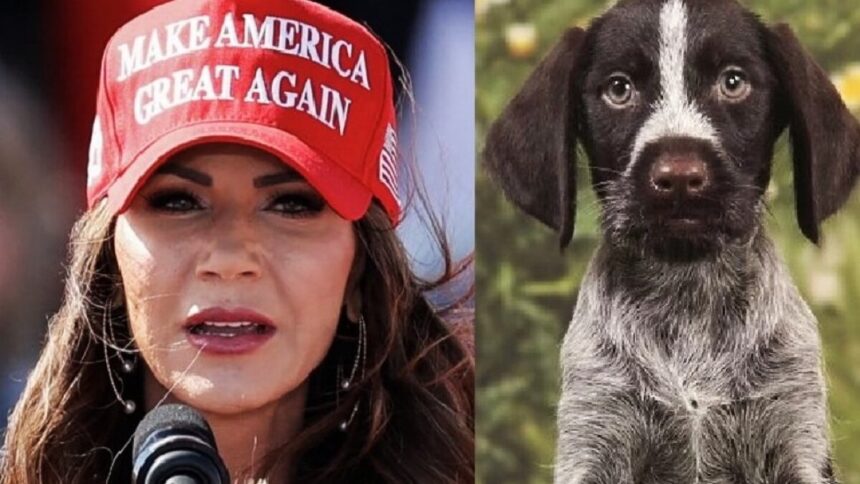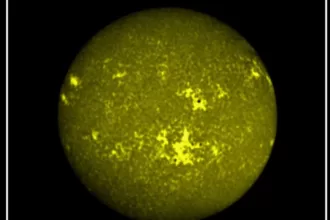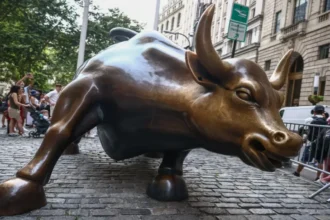Governor of South Dakota Kristi Noem, who is a potential running mate for Donald Trump, has sparked controversy with excerpts from her upcoming biography. She describes the choice to put down a “untrainable” dog in her book, which infuriated both political pundits and animal lovers. She has been under intense scrutiny as a result of this affair, which combined private deeds with political ramifications for the public.
Kristi Noem is being considered for a prominent position in the next presidential elections, thus the disclosure comes at a critical moment. According to her own account, the act of murdering her family dog has spurred a national dialogue on leadership and ethics, mirroring larger social norms towards animals and the obligations of public individuals.
Who is Governor Kristi Noem?
With extensive political experience, Kristi Noem was elected as South Dakota’s first female governor in 2018 following a distinguished tenure in the US House of Representatives beginning in 2010. She has worked in politics and has a diverse professional background as a rancher, farmer, and small business owner. Noem is a talented writer as well; her most recent work presents both personal and political viewpoints.
Because of her political background, she has been floated as a potential 2024 vice presidential running partner for Donald Trump. Noem has a history of taking on challenging themes head-on, so her career hasn’t been without controversy.
I dated an El Paso, Illinois, guy in college who was raised on a farm; he gave me an insight into a world that was both conventional and fascinating.
I saw farm life best represented by his family’s home, which was surrounded by huge flat expanses of land with no neighbors close by. His mother and sister would cook substantial midday meals for him and his sister, most likely using ingredients from their backyard garden.
The guys would go back to work after lunch, but not before I became smitten with his family—his father Dallas, mother Norma, elder brother Chip, and sister Diane.
During a memorable visit, I came upon a newborn raccoon that was about to be shot because it was a hazard to the corn field. I decided to save the raccoon, whom we called Rocky, and bring him back to college because I was raised in a metropolis. Dallas was amused at first, but agreed to the plan as long as the raccoon was kept off the property. For Rocky’s food, we were dependent on the kindness of the neighborhood grocer, who fed him leftover produce.
Rocky grew quickly, which disappointed me because I had hoped for a lively companion. However, he taught me a valuable lesson about the reality of farm life: not all animals are designed to be tamed.
Rocky’s aggression increased with maturity, a sign of his contempt for our well-meaning but ultimately futile attempt at domestication. After we got in touch with the local animal control officer, Rocky was let go into the forest. I was told he was free now, but I couldn’t help but worry how he survived without his regular diet of rotting apples, worm-infested maize, and wilted cabbage. Rocky could now easily obtain his food, unlike the difficulties of wild existence.
This tale, which many people have shared, highlights my urban upbringing. But it also emphasizes how much I’ve been learning about the difficulties of farm life, especially after being taken aback by Kristi Noem’s recent disclosure.
Following an excerpt from Governor Noem’s upcoming biography in which she acknowledged shooting Cricket, a 14-month-old dog, the incident attracted a lot of attention. Noem rationalized her actions by saying that Cricket had damaged a neighbor’s chicks on an unrestrained outing and had not yet shown the typical hunting instincts of her breed. The politician’s hasty decision to put the puppy to death seems to have resulted from Cricket’s misinterpretation of the difference between hunting and interacting with people.
Noem probably reasoned that writing about the event in her biography would strengthen her reputation as a strong leader who isn’t afraid to take risks and would make her more appealing as a prospective GOP vice presidential candidate. Other possible vice presidential contenders have responded by retaliating by posting pictures of themselves with their own pets, such as Ron DeSantis.
I suppose it’s true Kristi Noem united the right and the left by shooting her puppy.
I guess I’m old school but Trump suggesting shooting migrants at the border should’ve been that moment pic.twitter.com/f5HkhLSOBs
— Mike Madrid (@madrid_mike) April 29, 2024Pictures of dogs take over Twitter, now called X, and create a lot of conversation. Both Republicans and Democrats have criticized Noem for her activities, especially in light of their silence on other urgent concerns like gun violence in churches, synagogues, schools, and other gathering places.
View from farm friends
To ensure I wasn’t oversimplifying the story and falling into the urban/rural divide, I reached out to individuals with farming backgrounds to gauge their perspectives on the Cricket incident.
My first call was to my undergraduate buddy, Dr. John Schuler, a poet and psychologist who grew up on a farm. John, a Taurus who was well-known for his meticulous, patient storytelling, focused on the intricacies of farming life. He emphasized the dangers farmers face financially, pointing out that a lone raccoon in a cornfield or a runt in a litter of pigs can have an effect on profitability. He understood that severe choices were often necessary on a farm, but he thought Noem had made a grave mistake in what she had done. He maintained that it was not justified to shoot a 14-month-old puppy, given the dog’s inexperience and need for supervision and training.
Similar thoughts were expressed by Cheryl Tevis, an Iowa Writers Collaborative member and former employee of Successful Farming magazine who lives on a farm in Boone County. She expressed dismay at Noem’s choice to shoot the dog, pointing out that, despite their use in agricultural operations, farm dogs are usually beloved pets. The relationship between farmers and their dogs was highlighted by Cheryl, who also underlined that although working on a farm often means facing potentially fatal conditions, it is unusual and needless to shoot a dog for not performing up to par.
While difficult choices are a part of farming life, John and Cheryl both stressed that Noem’s approach to the matter was flawed and showed no compassion for the animal in question.
Read More: Rishi Sunak appoints Indian-origin professor to protect Britain’s natural history






